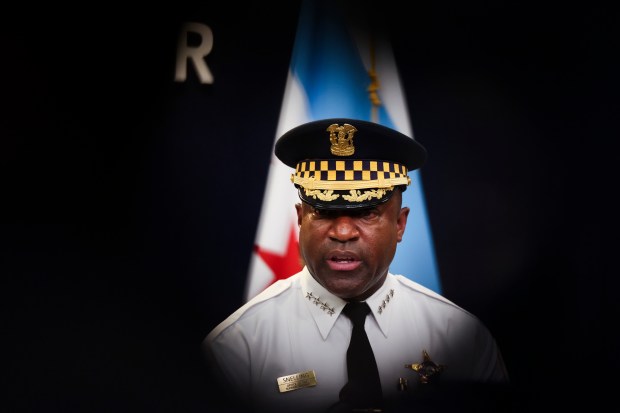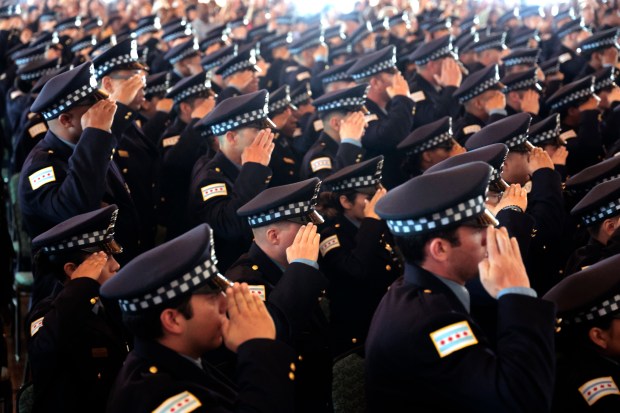While proceedings in high-profile police misconduct cases slowed to a trickle in 2024, the number of internal disciplinary actions initiated by Chicago Police Department supervisors nearly doubled from 2023, according to a Tribune analysis.
Records obtained via the Freedom of Information Act show CPD supervisors, mostly sergeants, filed more than 5,300 Summary Punishment Action Requests — “SPARs” — in 2024, a sharp increase from the 2,700 SPARs initiated in 2023.
The rise in internal CPD discipline comes as the external disciplinary process — where fewer, but more serious cases, such as those involving deadly force incidents, are handled — remains greatly curtailed as a legal fight carries on between the city and Fraternal Order of Police in the Illinois Appellate Court. No decision is expected anytime soon.
CPD’s overall staffing levels have remained effectively the same over the last two years, and the department has promoted only about two dozen new sergeants since the start of 2023, records show. But still, the uptick in SPARs — which, in theory, can help CPD leaders identify future misconduct patterns among rank-and-file officers — also coincides with long-standing concerns voiced by the independent monitoring team that assesses the city’s compliance with the federal consent decree.
The monitoring team, led by Maggie Hickey, has repeatedly called on the department to bolster its data collection, analysis and sharing practices. The consent decree, among its many mandates, also calls for CPD officers to see more consistency from their supervisors and to receive more feedback and accountability.
CPD Superintendent Larry Snelling said last year’s rise in SPARs could be attributed to both enhanced oversight by CPD sergeants as well as the relative inexperience of some officers who were cited.
“It’s not just about disciplining officers, it’s about their development,” Snelling said during an interview with the Tribune last week. “Our supervisors are taking a much better stance in their involvement in the development of officers and the accountability (process).”
“Suspending officers, that alone doesn’t result in better behavior (or) better actions on the part of the officer,” Snelling added. “We have to find out what our officers need and we have to make sure that we’re providing that to them.”
Staffing challenges have slowed CPD’s efforts to fully implement a program to ensure that no more than 10 officers are assigned to a single sergeant. A department-wide workforce allocation study is now underway and expected to be completed in late 2025.
Recent updates to CPD’s policy on body-worn cameras, another sticking point repeatedly highlighted by the monitoring team, may be another reason for the rise in SPARs. The Tribune found that CPD supervisors did not file any SPARs related to body-worn camera activation in 2023. Last year, however, supervisors initiated 281 SPARs for such violations, leading to 36 officer suspensions.
“The new policy — combined with new efforts for progressive discipline — should better ensure that interactions with police are appropriately recorded,” the independent monitoring team wrote in its ninth report on CPD compliance, published in May 2024. “This will greatly improve any subsequent reviews or investigations by detectives, supervisors, TRED (CPD’s Tactical Review and Evaluation Division), the Bureau of Internal Affairs, the Civilian Office of Police Accountability, the Inspector General, the IMT, and the public.”
The SPARs jump
A SPAR can result in an officer receiving a reprimand from a superior, a violation noted in the officer’s work history, or a suspension from one to three days.
Of the SPARs filed in 2024, CPD supervisors called for an officer to be suspended on 777 occasions, more than double the total of 2023, when supervisors called for 324 officer suspensions, records show.
To see the number of reprimands, violations, suspensions and total summary punishments each year, click on the dropdown arrow below.
The collective bargaining agreement between the city and FOP allows for an officer to challenge a SPAR only after the officer has already received three others in a 12-month span.
John Catanzara, president of the union representing rank-and-file CPD officers, theorized that the increase in SPARs was part of an effort to speed up the department’s internal disciplinary process.
“A SPAR is just that; it’s adjudicated right then and there with the supervisor and onward it goes from there,” Catanzara said. “It has its pluses and minuses because you can’t challenge a SPAR until you get your fourth one in 12 months, so there is no appeal process at that point like there is for grievance arbitration with a CR (case investigated by CPD Internal Affairs), so it’s a give and take.”
The most recent FOP contract with the city created the “Peoples Court,” another disciplinary adjudication system in which CPD officer misconduct cases are heard and decided by a third-party arbitrator, out of public view, in a single day.
The president of the union representing CPD sergeants, James Calvino, did not respond to interview requests for this story.
Trouble getting to court
Officer transgressions ranged from uniform violations to improper vehicle pursuits to inattention to duty. The most common citation, though, was for CPD officers who failed to show up to court.
SPARs for court appearance violations more than tripled from 2023 to 2024, jumping from 456 in 2023 to 1,638 in 2024. Records show CPD supervisors called for an officer to be suspended for at least a day on 232 occasions last year for missing court.
Veteran Chicago criminal defense attorney Steve Greenberg said an officer’s absence from court typically leads to even more delays in the already slow-moving Cook County judicial system.
“You can’t have a trial or a hearing without the officer,” Greenberg said. “So if someone’s in custody, it prolongs the amount of time they’re in custody, and the personal cost is great. The economic cost is great.”
More serious criminal cases — those involving CPD detectives, who are also represented by the FOP — rarely see issues with an officer showing up to court, Greenberg said. In other cases, such as weapons or narcotics possession, an officer’s attendance is far less predictable.
“There’s never been a mechanism in place to determine whether the officers are available,” Greenberg added. “It’s not until the officers first show up, or don’t show up, that the prosecutors ever find out if the officers are available.”

CPD Superintendent Snelling said the missed court dates were likely due to oversights or forgetfulness on the part of officers or other scheduling conflicts, such as vacation time or family emergencies.
“Beyond those things, we can not just accept excuses for officers not going to court,” Snelling said. “We want our officers to show up in court because they have a responsibility to do so.”
Police union boss Catanzara said supervisors’ recent crackdown on court appearances could also help stymie a larger anti-law enforcement sentiment.
“I think, in part, there’s a liability concern that you can’t put handcuffs (on) and take someone’s freedom away and then not follow through on the prosecution part of it,” Catanzara said. “It just leads to the false narrative of, ‘The police are doing something wrong here.’”



